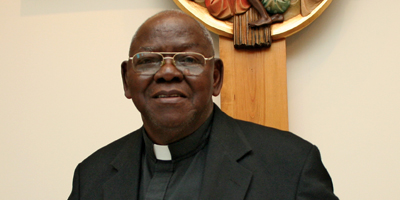
 AIKEN—Father Anthony K. Batung came to the United States in 2005 for what he thought would be a two-year sabbatical from his work in the Diocese of Wa in northwest Ghana.
AIKEN—Father Anthony K. Batung came to the United States in 2005 for what he thought would be a two-year sabbatical from his work in the Diocese of Wa in northwest Ghana.
Those two years, however, turned into five, serving four parishes and a mission in the Diocese of Charleston. He took the change in stride, just as he has approached other challenges that have come his way in 34 years of priesthood.
In a recent interview with The Miscellany, Father Batung said he has enjoyed learning about life in South Carolina, its history and the diverse needs of Catholics in the Lowcountry and Midlands.
“It’s been a wonderful experience for me,” he said. “I’ve gotten used to the differences between the United States and Ghana, and really, as Catholics we all have the same faith and follow the same doctrine and sacraments.”
Father Batung spent nine months as an associate at the Cathedral of St. John the Baptist, and was administrator at St. Mary Church on Yonges Island, Sts. Frederick and Stephen Mission on Edisto Island, and St. Patrick Church in Charleston. He has been administrator at St. Gerard Church in Aiken since May 2008.
Father Batung said he always tries to teach one core lesson: the importance of service and personal sacrifice. He encourages parishioners to nurture their own faith by taking on duties and responsibilities in the church.
“There is no little thing in the eyes of God,” Father Batung said. “No matter how you help others, it all boils down to the same charitable outlook. When we say ‘love one another,’ it should not just be in the air. You need to reach out and do something for others. That’s how you prove your love and your faith.”
Service has been a constant theme in the priest’s life, beginning with the 16 years he spent as a member of the St. Joseph Brothers, founded by the Missionaries of Africa in the Diocese of Wa, where he grew up.
Father Batung said he joined the order in 1953 because he saw the good example of priests, religious sisters and brothers while growing up in a Catholic family. He professed first vows in 1961 and spent many years teaching carpentry, making furniture for schools and pews for churches, and putting roofs on schools. He also studied at St. Francis Xavier Minor Seminary in the city of Wa.
His order was taken over by the Missionary Brothers of the Immaculate Conception in 1966. He professed vows for another three years, but in 1969, Father Batung realized that life as a religious brother was no longer what he wanted. People encouraged him to become a priest, although he originally thought he was too old at age 35.
Father Batung entered St. Victor’s Major Seminary in Tamale, Ghana, in 1971 and was ordained a priest in December 1976, at age 40. Over the next 29 years, he served as pastor at several churches around the Diocese of Wa, and built three new parishes. He also opened St. Monica’s Vocational School, which teaches girls weaving and dressmaking.
Father Batung said he is especially proud of this because it gives young women the skills to go into business for themselves. He also studied in Ireland and Kenya. Father Batung said life in Ghana often required his work go beyond traditional priestly duties.
“A lot of people there had a hard life because there was a lot of poverty,” he said. “I spent a lot of sleepless nights with people. Sometimes I had to be the ambulance and carry people to the hospital. You have to be dedicated to what you are doing. I’ve enjoyed my work as a priest. Things may be hard sometimes, but I have a peace that I know comes from God.”
In 2005, Father Batung asked his bishop if he could take a sabbatical in the United States. He came to South Carolina after Father Henry Kulah, a fellow Ghanaian, recommended him to Bishop Robert J. Baker. He was asked to stay longer than his initial assignment. The priest said he’s been welcomed at the parishes he’s served. He hopes he helped people learn the value of service and the power of a Catholic community working together.
In August, Father Batung will return to Ghana and begin retirement. He said he will probably continue to serve the Diocese of Wa in some way, and also hopes to pursue a lifelong love of gardening.
“I’ve heard from people that I’ve done some good while I was here,” he said with a smile. “I do hope that I’ve shown them the importance of involvement in your parish and in your community. If you come in the church and you see a candle isn’t lit, why don’t you be the one to light it? Once you are able to do something for the church and for other people, then you will have happiness.”

